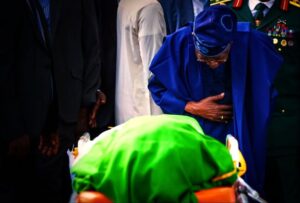By OLABODE OPESEITAN

Photo credit: Daily Trust
In Nigerian politics, betrayal is often met with retribution. The corridors of power are thick with grudges, and transitions rarely arrive untarnished. But on the solemn occasion of President Muhammadu Buhari’s burial, Asiwaju Bola Ahmed Tinubu defied the cynical playbook — and in doing so, etched a moment of statesmanship that may outlive them both.
Tinubu was no mere ally in Buhari’s ascent. He was the architect of Buhari’s political resurrection in 2015, offering strategic muscle and party infrastructure that turned persistent defeat into victory. But as Buhari’s second term waned and succession loomed, their bond strained. In a move that did not come as a surprise to many, Buhari withheld public enthusiasm for Tinubu’s presidential bid, instead backing then Senate President Ahmed Lawan for the All Progressives Congress (APC) ticket. It was a political slight of the highest order—one that could have justified coldness, or worse, calculated vengeance.
READ ALSO: Nigerian Army deals heavy blow to terrorists, criminals
Yet when Buhari died, Tinubu’s response was not guided by memory’s sting. It was shaped by duty. He mobilized the full dignity of state protocol, dispatching his Vice President and Chief of Staff to accompany Buhari’s body from London. At Daura, he stood with the bereaved family, overseeing a burial that balanced national honour with personal respect. And in a remarkable gesture, he convened a special Federal Executive Council session in tribute — his words, solemn and expansive, painting Buhari not just as a political partner but as a patriot who gave his life to the republic.
This display of grace did not go unnoticed. Buhari’s son, and other family members, spoke with warmth and gratitude. Tinubu, in turning from bitterness to benevolence, became the custodian of Buhari’s legacy—even when the late president’s own political instincts had once leaned elsewhere.
Indeed, the opposition African Democratic Congress (ADC) tried to diminish the moment, accusing Tinubu of theatrical excess. But the critique wilted in the face of public scrutiny—and the unmistakable moral clarity of Tinubu’s gesture.
A Lesson Carved in Protocol
There is a didactic depth to Tinubu’s conduct. It tells political elites—particularly those obsessed with succession strategy—that loyalty does not always flow from endorsement. The candidate you marginalize may become the fiercest defender of your legacy. The successor you anoint with pride may turn away when history calls for honour.
Tinubu’s actions urge leaders to rethink succession not as insurance, but as stewardship—one guided by character, not just calculation. Because in the end, it is not your preference but your principles that will endure.
And so, in Daura, amidst dust and prayer, bitterness was buried. In its place stood a living monument: that even in rivalry, dignity must remain. That grace, not vengeance, secures legacy. And that true leadership rises—not by repaying wounds—but by refusing to inflict them.














